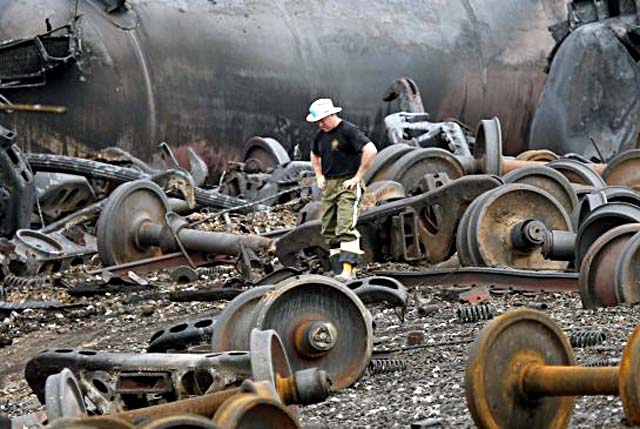

A police officer walks amongst Lake Megantic derailment debris - 9 July 2013 Mathieu Belanger.
13 August 2013 Federal Government Suspends
MMA's Operating Licence Ottawa Ontario - The federal government has barred the rail company responsible for the deadly Lake Megantic train explosion from operating in Canada, a move that could hamper Montreal Maine & Atlantic's (MMA) plan to pay for the devastation that hit the small Quebec town last month.
The Canadian Transportation Agency issued an order Tuesday morning that revokes the company's Certificate of Fitness as of 20 Aug 2013 based on its finding that MMA is no longer able to obtain adequate insurance that would cover it in the event of another accident.
"This was not a decision made lightly, as it affects the economies of communities along the railway, employees of MMA, as well as the shippers who depend on rail services," said Geoff Hare, Chair and CEO of the Canadian Transportation Agency.
"It would not be prudent given the risks associated with rail operations, to permit MMA to continue to operate without adequate insurance coverage."
The U.S.-based firm filed for bankruptcy protection in both Canada and the United States last week. The company said in court documents that it sought protection from at least seven potential creditors in order to "allow the partial and temporary resumption of services to customers" in Quebec and the northeastern U.S. as well as to "preserve and maximize the value of the assets for the benefit of all the creditors and potential creditors."
The company's current insurer has so far refused to cut any cheques to the firm, which already owes more than $8 million on the disaster cleanup bill, because of the escalating number of claims, including a class-action suit filed on behalf of the 47 people believed killed in the 6 Jul 2013 train derailment and explosion.
Montreal lawyer Jeff Orenstein, who has filed a class-action lawsuit against the company on behalf of those who lost family, business, and income in the accident, said the agency's ruling complicates MMA's plan to pay off lawsuits, bills, and other claims but won't stop those who are seeking compensation.
"This is exactly what we expected," he said in an interview.
In anticipation that MMA would be unwilling to pay a multi-million-dollar settlement on top of the mounting cleanup bills, Orenstein said a decision was made to add to the suit parent company Rail World, World Fuel Services, which owned the petroleum, and Irving Oil, which was to refine the product.
The agency's decision was no great shock in Lake Megantic, which has had to pick up the rail company's unpaid bills along with the Quebec government since the outset of the disaster.
"This news was foreseeable, so there's no surprise," said Nicolas Carette, a spokesman for Mayor Colette Roy-Laroche. "But we are conscious of the need to have a rail network that is efficient and safe to service our industries and we hope a solution will be found quickly."
Tafisa Canada, Lake Megantic's largest employer, is one of those companies most affected by the loss of rail service. The plant produces particle board for Ikea and has had to establish a trucking network to get its goods to market. Last month, the company said in a statement that 30 percent of its production is dependent on rail service to get to western Canada and the U.S. Midwest and southeast.
The transportation agency's review of the rail carrier's ability to continue operations began just days after the accident, which appears to have been caused by improperly applied brakes that failed to stop the 72-car train from rolling 12 kilometres into the town at a speed of more than 100 km/h before derailing at a main downtown strip.
Based on a review of the company's financial statements going back to 2009, the agency says it no longer has confidence that MMA has enough self-insurance to pay both the Lake Megantic claims and obtain coverage for the equivalent of two additional accident claims, which is the standard for maintaining the necessary operating permissions.
"The agency has concluded that MMA is not financially capable to absorb even the first self-insured retention amount," Hare's statement said.
A spokesperson for the Canadian Transportation Agency said in an interview that MMA is free to provide additional information to prove it has obtained sufficient insurance coverage and can also appeal the agency's decision.
It can also work out an arrangement to allow another rail carrier to use its tracks as a way of generating income, though such a plan would have to be approved by a court-appointed bankruptcy monitor and any such firm would still need to seek federal approvals to run on MMA's tracks.
Author unknown.



Vancouver Island
British Columbia
Canada
| 
